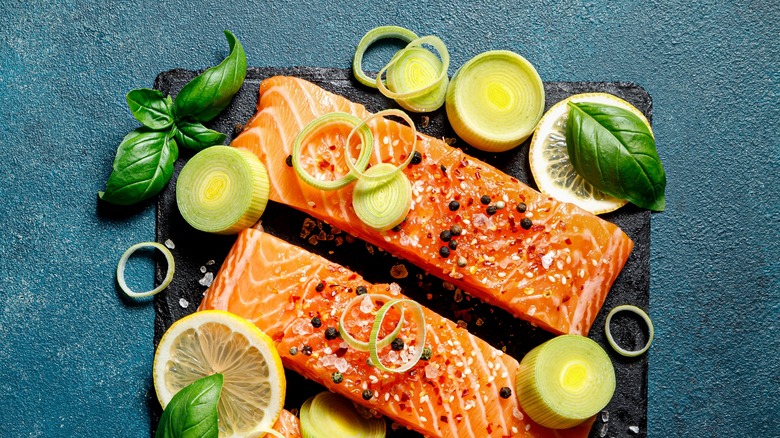Your Risk Of Early Death Goes Up If You Stop Eating This Healthy Protein
When the conversation of premature death becomes a dinnertime topic (fun), the focus is mostly on how you're more likely to die if you eat certain foods, and processed foods and added sugars never fail to make the list. But what about the foods you should be eating, but aren't?
Fatty fish (fish rich in omega-3 fatty acids) is one of the healthy proteins you should be adding to your diet to reduce the risk of early death. A 2018 study published in The Journal of Clinical Lipidology involving 2,500 elderly participants found that those whose omega-3 fatty acid levels were highest were 34% less likely to expire within the next seven years. They also had a 39% lower chance of experiencing a heart attack or stroke.
Meanwhile, a 2021 study published in the American Journal of Clinical Nutrition found that a diet characterized by low omega-3 is as powerful a predictor of premature death as smoking. "It is interesting to note that in Japan, where the mean Omega-3 Index is greater than 8%, the expected life span is around five years longer than it is in the United States, where the mean Omega-3 Index is about 5%. Hence, in practice, dietary choices that change the Omega-3 Index may prolong life," shared lead author Michael McBurney (via EurekAlert).
The heart-healthy fats in fish could help you live longer
In the world of fats, there are ones that aren't too great for your overall health; think saturated fats and trans fats. And then there are healthy fats, like monounsaturated and polyunsaturated fats, that are actually associated with lowering disease risk. Omega-3s, found in fatty fish, are polyunsaturated fatty acids.
A 2021 McMaster University study published in JAMA Internal medicine involving 192,000 participants from almost 60 countries found that consuming fatty fish regularly (two servings each week) could help prevent cardiovascular disease in people prone to the condition, like those with heart issues and stroke. According to study co-lead and professor of medicine at the Michael G. DeGroote School of Medicine, Dr. Salim Yusuf (via Science Daily), "This is by far the most diverse study of fish intake and health outcomes in the world and the only one with sufficient numbers with representation from high, middle, and low-income countries from all inhabited continents of the world."
It is no secret that omega-3 fatty acids are great for heart health. Older studies have come to similar conclusions. These healthy fats keep your blood pressure levels low, reduce triglyceride levels, and combat irregular heartbeats. While some triglycerides are necessary for overall health, too much is associated with heart disease and stroke. Consuming enough fatty fish is also linked with a boost in brain health, reducing the risk of certain cancers, and preventing rheumatoid arthritis, all of which could be important factors when it comes to early death.
How to include fatty fish in your diet
While natural fish lovers won't need a reason to start eating more fish, we also get that fish is not everyone's cup of tea, as the smell, taste, or texture can be off-putting for some. However, the key is to get creative and find unique ways to include this heart-healthy food in your diet. For instance, grilling fish with a dash of lemon can enhance its flavor. There are also various recipes, like curries and tacos, that feature fish as a main ingredient.
As for just how much of this healthy protein you need to be consuming to prevent an early death, the recommendation from the Dietary Guidelines for Americans is 8 ounces a week, divided over a couple of meals or spread out throughout the week.
For those concerned with mercury levels and how this might impact your overall health, the expert view on this is that as long as you're not consuming fish excessively, the heart-healthy benefits of fatty fish outweigh the risks posed by mercury ingestion. Typically, ocean-caught fish are considered to be high in mercury, so doing some research on where your protein comes from could also help. If you're wondering what types of fish are best, you're going to want to go with salmon, sardine, cod, herring, lake trout, light tuna (canned), Atlantic mackerel, bluefin tuna, whitefish, striped bass, and cobia, as they are the best sources of omega-3s.



